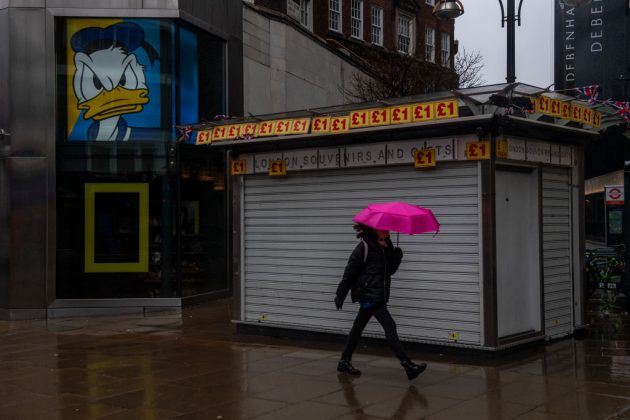UK GDP: How City analysts reacted to the record economic slump

The City was hit with some sobering figures this morning, as the latest official data showed UK GDP suffered its largest annual fall on record.
The economy shrank 9.9 per cent in 2020 as a result of the Covid-19 pandemic, but narrowly avoided a double-dip recession with growth of one per cent in the final quarter of the year.
Here’s what analysts made of the numbers.
‘Less bad than expected’
The GDP figures are “less bad than expected”, says PwC chief economist Jonathan Gillham, adding that Brits are becoming more adaptable to lockdowns from an economic perspective.
“However, this is still the largest contraction in GDP on record and the economy is still eight per cent smaller than it was pre-Covid.
“To put this into perspective, every person in the UK is roughly £3,300 worse off than they were in 2019 on a net basis.”
Despite the modest growth in UK GDP the fourth quarter, Gillham warns there is “still much to be done” before the economy fully recovers.
“Key sectors such as retail and accommodation are still struggling significantly and this is having a serious impact on employees and business owners. As a consequence, we may see substantial price rises in these sectors over the next 12 months as business owners battle with supply chain issues and disruptions at the UK border.”
‘The tunnel keeps getting longer’
Susannah Streeter, senior investment and markets analyst at Hargreaves Lansdown, says the UK GDP data “underlines the damage wreaked by Covid on businesses up and down the country”.
“There is still a mountain to climb in this recovery and there will be a lot more pain to come given the current nationwide shutdowns.
“With no road map yet laid out to the re-opening of the economy, it’s hard to see the light at the end of the tunnel when the tunnel keeps getting longer.”
Streeter says Bank of England chief economist Andy Haldane has done his best to drum up confidence, but warns: “The forecast that the economy will bounce back like a coiled spring as people spend the savings they have amassed during lockdown will depend on just how easy it will be to splash that cash.”

‘Quite shocking’
The Office for National Statistics warned its UK GDP figures may be less accurate than usual due to the massive change in the economy this year.
Nevertheless, the figures are “quite shocking”, says Rachel Winter, associate investment director at Killik & Co.
“It’s good to see the improvement in the monthly data since the record fall that occurred in April. Although some of this improvement can be attributed to the relaxing of lockdown restrictions that has occurred throughout the latter part of the year, it’s also likely that businesses have adapted to operate more effectively within the restrictions,” she says.
“The new capabilities gained during the last year should help to drive UK economic growth in future.”
‘A small mercy’
Richard Hunter, head of markets at Interactive Investor, says the UK GDP figures “may not be cause for celebration, but avoiding a double-dip recession is a small mercy”.
“Growth in the fourth quarter of one per cent was made possible by the country not being locked down for the whole period and, perhaps equally importantly, by the fact that many companies were rather better prepared having experienced the effects of the pandemic earlier in the year”
Hunter warns there is “every likelihood” of a contraction in the first quarter of this year after the UK was plunged back into another full lockdown.
“More positively, the release of pent-up demand after restrictions have been eased could provide a significant boost as the year progresses.”